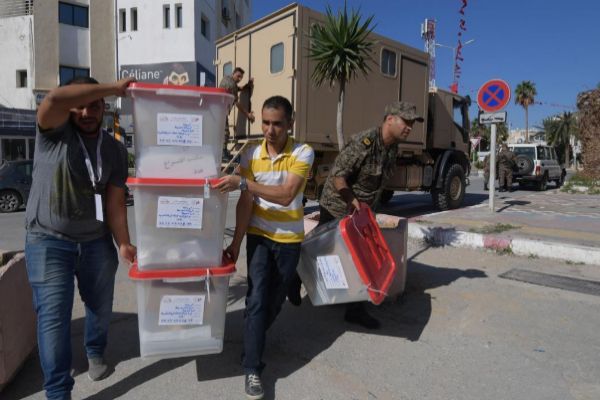- Revolution.Generation Casbah: Young people who are changing Tunisia
- Maghreb Professor Kais Saied, winner of the presidential elections in Tunisia according to polls
More than eight years ago, Mohamed Marzuk was one of the leaders of the Tunisian Casbah rebellion. He commanded hundreds of young people who had emerged as the protectors of the revolution against the dictatorship of Ben Ali. The dictator fled on January 14, 2011, after a wave of popular protests, these boys wanted to make sure that the regime did not regenerate again and remained on the streets for weeks until a true transitional government was created.
Not far from the winding streets that lead to the Plaza de la Casbah, but a few years later, we find Marzuk in one of the elegant rooms of the Africa hotel. It continues in its thirteen to protect the revolution. And he continues to lead an army of young people, but this time they don't sit down. They are now independent observers and, since the first free elections in independent Tunisia, in October 2011, they monitor each electoral process. The NGO Murakibun (which translates something like "controllers") is one of the Tunisian civil society organizations dedicated to preserving the transparency of the democratic process of the North African country.
"The great problem of this country for 41 years is that the whole regime rested on a system of falsified elections. It was not a military or police regime that sustained the dictatorship, but a false electoral system. We already know how pressure can be put on elections because the first opposition candidate against Ben Ali in 2004, Mohamed Ali Haluani, is the father of one of the founders of our organization, "Marzuk, today president of Murakibun, tells EL MUNDO.es. Haluani Sr. obtained 0.95% against the overwhelming 94.49 of Ben Ali . All a feat then before a dictator who won by 99% of the votes without blushing.
More than eight years after the fall of the satrap, the picture has changed completely and the results in the Ministry of Interior are no longer cooked. To guarantee this is civil society. Now, candidates have to fight vote by vote. Seven million Tunisians were called to vote in the presidential elections that were held this Sunday to choose between two candidates: media mogul Nabil Karui and university professor Kais Saied. The results will be announced on Monday, after the vote count certified by the Independent Electoral Instance (ISIE) . However, polls carried out at the ballot box on Sunday, have announced that the winner of the elections is Kais Saied.
Precisely one of the first things that civil society pressed since 2011 was the creation of an independent authority to organize the elections. "Our goal was to bring out the organization of the elections of the Ministry of Interior and we won the battle when the ISIE was created," says Marzuk.
trust and neutrality
The beginnings of Murakibun were humble: even one of the founders had to sell his car to finance the project. But today, with the help of European funds, they have a network of almost 4,000 observers who are deployed through the polling stations in fixed and mobile teams to examine the electoral process and record any incident.
"Our goal is multiple: to defend the ISIE against its detractors, to protect its image of neutrality, to give confidence to the voters in the electoral process and at the same time to make the political parties themselves accept the results," says Marzuk.
Encased in blue vests, Murakibun observers attend the vote and vote count in a sample of schools covering 35% of the country. Their statistics are, today, the most reliable because of the volume of data they handle. "We make our own tabulations to obtain representative results and then check if they are in line with the ISIE. If not, we denounce it," explains Slim Buzid , director of the NGO.
Murakibun are not alone: the always active Tunisian civil society warned from the beginning that the elections could be an Achilles heel and got down to work. In March 2011, the Tunisian Association for the Integrity and Democracy of Elections (ATIDE) was created , which, among other things, focuses on monitoring whether the electoral campaigns of the different candidates respect equity. Also on the ground is IWatch, the Tunisian branch of Transparency International, which monitors voter registration, the budgetary integrity of the parties, the activity of lobbies, the affiliations of independent candidates, in addition to the neutrality of the ISIE. And beyond the polls comes the research of Al Bawsala, who studies the work of legislative and executive institutions, from parliamentary activity session by session to budget management.
The work of these organizations to print transparency and guarantee elections is key in every vote and one of the pillars of the success of the Tunisian transition. In these and other civil associations the so-called "Tunisian exception" is supported, the key that explains why the revolution has not derailed in the country of jasmine as in other geographies of the Arab Spring. "Among the reasons why the political transition is consolidating in Tunisia is the strength of civil society, which creates stable institutions," analyzes Andrew S. Natsios , head of the electoral observation mission of IRI / NDI , two American think tanks. "In addition, I would add the high rate of education, the breadth of women's rights in this country and a society motivated by its process."
According to the criteria of The Trust Project
Know more- Tunisia
- World
EEUUTrump compares the intelligence official who leaked the Ukrainian call with a "spy"
Maghreb Professor Kais Saied, winner of the presidential elections in Tunisia according to polls
Tunisia Young Tunisians turn their backs on Parliament

